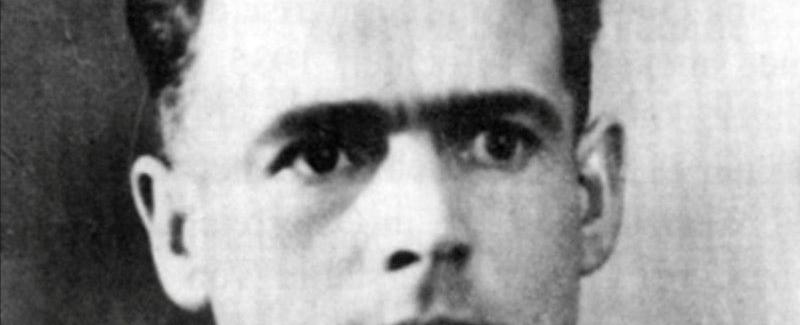Blessed Franz Jägerstätter: A Conscientious Objector

On May 21, Franciscans honor the memory of Blessed Franz Jägerstätter (1907-1943), an Austrian Secular Franciscan who was a conscientious objector executed by the Nazis.
Raised in farmland
Franz was born on May 20, 1907, in the village of Sankt Radegund, Upper Austria, in a mountainous area along the German border. He was an illegitimate child, the son of Rosalia Huber, a housemaid, and a local farmer. His parents could not afford a marriage, so Franz was raised by his grandmother until 1917, when Rosalia married a prosperous farmer, Heinrich Jägerstätter, who adopted her boy.
Popular, wild young man
As a young man, Franz left home to work on a farm in another town and then in a mine. Returning to St. Radegund in 1930, Franz was a popular, somewhat wild young man, who rode about in a motorcycle and fathered an illegitimate child. However, he gradually accepted the responsibility of parenthood and developed a good relationship with his daughter.

Franz and his motorbike, after his first deferment, 1940
Falling in love and settling down
His life took a more serious turn when he fell in love with Franziska Schwaninger; they wed in 1936; he settled down, working as a farmer. His wife was a seriously committed Catholic, and the two studied the Bible assiduously. The couple had three daughters of their own over the following years.

Wedding of Franz and Franziska, 1936
Living in difficult times
These were difficult times in Europe, reeling under the impact of the Great Depression and political unrest. In 1938, Hitler’s Nazi regime in Germany incorporated Austria in the Anschluss; Franz was the only person in St. Radegund to vote against it.
Joining Third Order of St. Francis
In June 1940, Franz was drafted into the Wehrmacht, but after a brief training period received a deferment. He was called up for service a second time that October for further training. Meanwhile, he joined the Third Order of St. Francis (Secular Franciscans) in December 1940. He received another exemption as a working farmer in April 1941.
Convinced he could not be a true Nazi
At this time, he began studying seriously Nazi ideology and tactics, especially the euthanasia of thousands of mentally handicapped children and adults. He became convinced that he could not be a true Nazi and a committed Catholic.
Found guilty of sedition and executed
With the war beginning to go badly for Germany, Jägerstätter was again called up for military service early in 1943. This time he refused to take an oath of allegiance to Hitler and said that he could not take up weapons on religious grounds. He was immediately arrested and transferred to Berlin to await trial. There he reiterated that “due to his religious views, he refused to perform military service with a weapon, and that he would be acting against his conscience were he to fight for the Nazi state,” although he did state that he would be willing to serve as a paramedic. This was refused, and he was found guilty of sedition and executed by guillotine on August 9, 1943.
His story resurfaces
Jägerstätter's case was largely forgotten for years. His story resurfaced with the publication in 1964 of his biography, "In Solitary Witness," by American professor and pacifist Gordon Zahn.
Gaining renewed attention
A few years later, Franz gained renewed attention in his native Austria. In 2007, he was officially beatified by Pope Benedict XVI. Franz’s wife, Franziska, almost 100 years of age, was present with their daughters for the ceremony in Linz. Now a new generation is getting to know Franz through the compelling film "A Hidden Life" (2019).

Franz's parish church in Sankt Radegund
Franz Jägerstätter, awaiting execution:
Dominic Monti, OFM
Professor of Franciscan Research in the Franciscan Institute of St. Bonaventure University
Dominic V. Monti, OFM, is a Franciscan Friar of Holy Name Province (USA) and currently professor of Franciscan Research in the Franciscan Institute of St. Bonaventure University. He devoted the greater part of his ministry to teaching the History of Christianity, in particular the history of the Franciscan movement. He has contributed two volumes to the Works of St. Bonaventure series and is author of Francis & His Brothers, a popular history of the Friars Minor.

